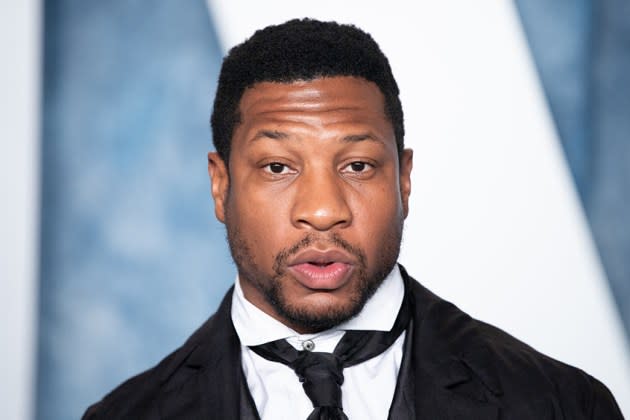Jonathan Majors Guilty of Harassment and Assault

Jonathan Majors was convicted of assaulting his ex-girlfriend, Grace Jabbari, after a domestic dispute earlier this year. A Manhattan jury found the Marvel actor guilty on Monday of two misdemeanor counts of harassment and assault but acquitted him on two other counts.
The six-person jury found Majors not guilty on one count of intentional assault in the third degree and one count of aggravated harassment in the second degree. Majors, wearing a dark gray suit and seated in the courtroom with his attorneys and current girlfriend Meagan Good, did not react when the verdict was read.
More from Variety
Marvel Studios Drops Jonathan Majors Following Guilty Verdict for Harassment and Assault
Jonathan Majors Trial: No Verdict Yet, Jury to Resume Monday
Judge Michael Gaffey set a sentencing date of Feb. 6. Majors faces up to a year in jail, but he could also be sentenced to probation.
Majors was arrested in March in New York City after he assaulted Jabbari in the backseat of a private vehicle. Jabbari, a 30-year-old choreographer who met Majors on the set of Marvel’s “Ant-Man and the Wasp: Quantumania,” testified she grabbed Majors’ phone after seeing a text message from another woman. Jabbari described that as Majors attempted to forcefully retrieve his phone from her, she felt “a hard blow” across her head that resulted in bruising, swelling and substantial pain.
Shortly after the guilty verdict, Marvel Studios severed ties with Majors, who played the central villain, Kang the Conqueror, in Disney’s Marvel Cinematic Universe. The 34-year-old actor was expected to appear in upcoming installments in the comic book franchise, including 2026’s “Avengers: The Kang Dynasty.”
Majors still “has faith in the process and looks forward to fully clearing his name,” his defense attorney Priya Chaudhry said in a statement.
“It is clear that the jury did not believe Grace Jabbari’s story of what happened in the SUV because they found that Mr. Majors did not intentionally cause any injuries to her. We are grateful for that,” Chaudhry said. “We are disappointed, however, that despite not believing Ms. Jabbari, the jury nevertheless found that Mr. Majors was somehow reckless while she was attacking him.”
The two-week-long trial concluded in a lower Manhattan courtroom after the jury requested to hear the definition of harassment in the second degree, which is when a person is guilty of “intent to harass, annoy or alarm” another person; “he or she strikes, shoves, kicks or otherwise subjects such other person to physical contact, or attempts or threatens to do the same.”
Before making its verdict, the jury also asked to review surveillance footage, as well as testimony from a woman who attended a nightclub with Jabbari after the assault.
During the trial, prosecutor Kelli Galloway told jurors that Majors was manipulative and controlling to Jabbari throughout their two-year relationship. The Manhattan District Attorney’s Office released texts and audio recordings as evidence, in which Majors seemingly attempted to dissuade Jabbari from going to the hospital to treat a head wound and threatened suicide over an argument. In an audio recording that played for the jury, Majors told Jabbari that she needs to act like Coretta Scott King and Michelle Obama because he’s “a great man” who is “doing great things, not just for me, but for my culture and the world.”
“What this really boils down to is four simple words: control, domination, manipulation and abuse,” Galloway told the jury in her closing statement. “[Those are the] tactics used by those who commit domestic violence against partners, against Grace.”
Manhattan District Attorney Alvin Bragg said in a statement after the verdict, “At the Manhattan D.A.’s Office, we are committed to centering survivors in all of our work. The evidence presented throughout this trial illustrated a cycle of psychological and emotional abuse, and escalating patterns of coercion far too common across the many intimate partner violence cases we see each and every day. Today, a jury determined that pattern of abuse and coercion culminated with Mr. Majors assaulting and harassing his girlfriend. We thank the jury for its service and the survivor for bravely telling her story despite having to relive her trauma on the stand.”
Majors denied that he assaulted Jabbari, and his defense team alleged that Jabbari was the aggressor in the vehicle that night. The defense also argued that Jabbari fabricated the allegations to get back at Majors after their breakup. In her closing argument, Chaudhry called Jabbari a “liar” who “bends reality.”
Last week, the driver in the car on the night of the alleged incident testified, through an Urdu interpreter, that Majors “was not doing anything” to Jabbari in the vehicle. But while Majors was trying to get out of the car, he was “trying to throw her in,” the driver told jurors: “I do remember [Majors] was pushing her back into the car to get rid of her.”
Majors’ career in Hollywood had been on the rise before he was arrested. The Emmy-nominated actor appeared in two 2023 tentpoles, “Ant-Man 3” and “Creed III,” as well as the indie “Magazine Dreams,” which was acquired by Searchlight Pictures at this year’s Sundance Film Festival. The studio removed the project from its release schedule in the wake of the allegations.
As part of the fallout, Majors was dropped by his manager, Entertainment 360, and his publicity firm, the Lede Company. He remains repped by the talent agency WME.
Best of Variety
Sign up for Variety’s Newsletter. For the latest news, follow us on Facebook, Twitter, and Instagram.